After my disappointment with the selection of heroes in episode 2 I am delighted to report that Daisy Goodwin and co did a very much better job with heroines, looking at them from the 18th Century Gothic novels through to Bridget Jones.
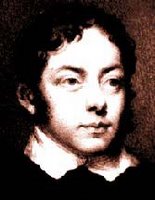 Goodwin dismissed the heroines of Gothic novels (such as The Castle of Otranto, from which she quoted) as rather feeble. While I have a certain soft spot for the more, well, gothic of the Gothic novels (Matthew Lewis's (left) The Monk, for instance), I cannot dispute any suggestion that the heroines are not their strongest point.
Goodwin dismissed the heroines of Gothic novels (such as The Castle of Otranto, from which she quoted) as rather feeble. While I have a certain soft spot for the more, well, gothic of the Gothic novels (Matthew Lewis's (left) The Monk, for instance), I cannot dispute any suggestion that the heroines are not their strongest point. Jane Austen must have had the same views, as she satirised gothic in Northanger Abbey, and came up with much stronger heroines in her later books. Goodwin, predictably, picked out Elizabeth Bennet for particular scrutiny, illustrated by Jennifer Ehle. Personally I think that Emma Woodhouse might have been an even better case study, but the best recent adaptation was not made by the BBC.
Jane Austen must have had the same views, as she satirised gothic in Northanger Abbey, and came up with much stronger heroines in her later books. Goodwin, predictably, picked out Elizabeth Bennet for particular scrutiny, illustrated by Jennifer Ehle. Personally I think that Emma Woodhouse might have been an even better case study, but the best recent adaptation was not made by the BBC. From Austen we moved on to the Brontës, or rather Jane Eyre, with plenty of time to dwell on Toby Stephens and Ruth Wilson. Charlotte Brontë created Jane Eyre in part at least as a response to Austen's heroines and Goodwin brought out the contrast well, even if we did spend too long on the nature of governesses (but with nobody suggesting that they were "half of them detestable and the rest ridiculous, and all incubi").
From Austen we moved on to the Brontës, or rather Jane Eyre, with plenty of time to dwell on Toby Stephens and Ruth Wilson. Charlotte Brontë created Jane Eyre in part at least as a response to Austen's heroines and Goodwin brought out the contrast well, even if we did spend too long on the nature of governesses (but with nobody suggesting that they were "half of them detestable and the rest ridiculous, and all incubi")."My dearest, don't mention governesses; the word makes me nervous. I have suffered a martyrdom from their incompetency and caprice. I thank Heaven I have now done with them!"
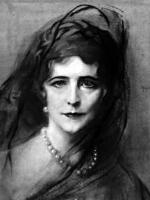 Then it started to get interesting, for we moved into the 20th Century and alighted upon Madame Zalenska from Elinor Glyn's Three Weeks. Goodwin took the book to a reading group in Yorkshire, and concluded from their responses that time has not been kind to Elinor Glyn, and, judging by the clips from a 1977 production, neither were Thames Television, with Elizabeth Shepherd vamping for all she was worth over a rather bored looking tiger skin, and a young Simon McCorkindale as Paul Verdayne not really knowing where to look.
Then it started to get interesting, for we moved into the 20th Century and alighted upon Madame Zalenska from Elinor Glyn's Three Weeks. Goodwin took the book to a reading group in Yorkshire, and concluded from their responses that time has not been kind to Elinor Glyn, and, judging by the clips from a 1977 production, neither were Thames Television, with Elizabeth Shepherd vamping for all she was worth over a rather bored looking tiger skin, and a young Simon McCorkindale as Paul Verdayne not really knowing where to look.It was no surprise that our next heroine saw Goodwin back in her crinoline and walking the streets of Atlanta in search of Scarlett O'Hara. I am probably alone in thinking that the world might be a better place if Margaret Mitchell had stuck to her original idea of naming her heroine "Pansy" and Melanie Hamilton "Permalia".
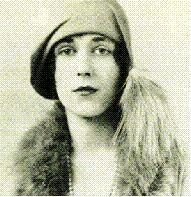 Unfortunately the urge to illustrate the whole discussion with old films and television dramatisations took a turn for the worse when Goodwin moved on to Georgette Heyer. Jenny Haddon, chair of the RNA, said some wonderful things about Heyer, as did Elizabeth Buchan and assorted others, but this was somewhat undercut by a short clip from the abominable film of The Reluctant Widow, and a brief extract from Venetia where she and Damerel discuss his orgies, accompanied by shots of neon signs from sex shops.
Unfortunately the urge to illustrate the whole discussion with old films and television dramatisations took a turn for the worse when Goodwin moved on to Georgette Heyer. Jenny Haddon, chair of the RNA, said some wonderful things about Heyer, as did Elizabeth Buchan and assorted others, but this was somewhat undercut by a short clip from the abominable film of The Reluctant Widow, and a brief extract from Venetia where she and Damerel discuss his orgies, accompanied by shots of neon signs from sex shops.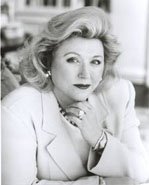 But at least Heyer was given plenty of space. The heroines of early feminist fiction (I am thinking of Isadora Wing, for instance) were skipped completely and we landed in the 1980s with Barbara Taylor Bradford's Emma Harte. The Yorkshire reading group found that she, too, had not aged well. Many had read it 25 years ago when it had seemed to capture some sort of Zeitgeist, but, like Kenneth More and Nyree Dawn Porter in The Forsyte Saga, it is one of those things that is best left to the fond embrace of memory. Bradford herself was good value in interview, however.
But at least Heyer was given plenty of space. The heroines of early feminist fiction (I am thinking of Isadora Wing, for instance) were skipped completely and we landed in the 1980s with Barbara Taylor Bradford's Emma Harte. The Yorkshire reading group found that she, too, had not aged well. Many had read it 25 years ago when it had seemed to capture some sort of Zeitgeist, but, like Kenneth More and Nyree Dawn Porter in The Forsyte Saga, it is one of those things that is best left to the fond embrace of memory. Bradford herself was good value in interview, however.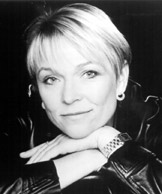 From Emma Harte's 1980s the final stop was Bridget Jones' 1990s, and the rise of Chick Lit.
From Emma Harte's 1980s the final stop was Bridget Jones' 1990s, and the rise of Chick Lit.Along the way Goodwin asked some interesting questions about what a romantic heroine is looking for. In the 19th Century it was inevitably marriage - but not necessarily marriage on any terms. In the 21st Century it is a great deal more complicated than that. Goodwin's final session, with a group of schoolgirls, did not really come up with any suggestions about where the romantic heroine goes next, but it is something worth thinking about.

No comments:
Post a Comment